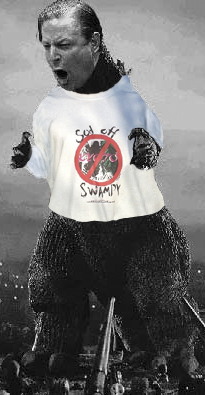Ebola Gives the HuffPo a THOROUGH Fisking
…as they agitate to liberate Guam.
“Guam–the only occupied U.S. territory in the Pacific–was the first island to be invaded by the Japanese and the last to be liberated by the United States.”
The only occupied US territory in the Pacific? If you’re looking for civilian US territorial populations during WWII, why not mention the Philippines? I notice it is mentioned only in passing, which suggests some ignorance of Philippine history, especially during the time period being discussed. The Philippine islands were attacked at virtually the same time as Guam, ironically in the midst of seeking their independence from the United States, and weren’t liberated from Japanese forces until March of 1945, almost a year after the liberation of Guam. The Philippines may have departed as a US territory in 1946, but let’s not pretend that they weren’t one and that we didn’t lose American and Filipino lives over that area to make a facile appeal to emotion case that purposely or ignorantly devalues lives lost.
Philippine (civ/mil) and United States military deaths were between half a million and a million and a half, by most estimates. Guam losses were between one to two thousand dead, with the census at the time placing the population at 20,000; while “10%” might be statistically correct if we assume the most extreme estimations, it is absolutely feckless to insinuate that our honored dead matter more or less than some other grouping of our dead, only relative to the landmass on which they are killed or that their impending status as a non-territorial organism of the United States somehow made their lives worth less.
“The United States, however, continuously disregards Guam’s sacrifices….not only did the act fail to provide meaningful citizenship rights, it explicitly stated that the president could still dispose of Guam’s land for military purposes at will.“
The Organic Act and subsequent Acts until 1952 gave the exact same citizen rights as other territories enjoy to this day. Here on Guam individuals have all the benefits of being an American citizen, except for voting for President; the population of which could move towards becoming an associated free state, like Micronesia, an incorporated territory or remain an unincorporated territory. The 14th Amendment assures individuals of citizenship rights in territories, and the Organic Act incorporated Guam as a territory, rather than a military rule. It is well within the power of the people of Guam to incorporate, move for independence or remain, if that is their wish. The fact that author implies they are simply being stripped of their due rights is blatant victimization, as though they had no say in their relation to the United States. This is vaguely ironic to put forward; especially given the absence of nearly any mention of the Philippines, a now independent self-governing body that peacefully achieved that independence, directly after WWII, from the U.S. and then booted the remaining U.S. military out 1991.
“Guam’s veterans receive inadequate medical services and communities adjacent to military bases generally obtain the least investment of any community under the U.S. flag.“
As the U.S. Naval hospital on Guam cares of retirees, active duty and more, while also working with Guam Memorial Hospital to take on emergency care of the local population, when and where they can, I’d love to see some backing of this statement that actually makes a legitimate comparison to contiguous US services offered to my fellow veterans, much less citizens surrounding those bases.
“Now, a proposed military buildup is opening old wounds as it aims to bring 35,000 additional military personnel to Guam and take up 2,500 more acres of land.“
The author is overshooting that number by 30,000 additional military personnel. Only 5,000 Marines and their families are planned to be moved to Guam. The 2,500 acres are on Northwest Field, which is military land already. The effects of that are the installation of a range and possible impacts to the Ritidian Wildlife Refuge, near it, which is a separate argument based on environmentalism.
If the author wants to make the case that US territories, or even specifically Guam, as Puerto Rico has had a number of votes on the matter, should be encouraged to vote on their status as a territory? That’s fine, I’m all for it. However, the author chose not to bother actually examine history, because it would have been inconvenient to an appeal to emotion fallacy she wished to propagate. The author appears to seek value and devaluing the lives of US military, citizens and territorial citizens lost and impacted by the war, based on where they were lost, to further add emotional emphasis to that fallacy. That includes the lives of a great number of people on this island and even my own family members, who fought through this island chain to push the Japanese back from US territory.
TL;DR The author should be ashamed. The Huffington Post should have invested at least an iota of effort in fact checking.
~ Ebola
The contents of this rebuttal are the personal views of the poster, not the views of the Government of Guam, United States Government, military or any of its components.

Excellent history/civics lesson!
Thanks!!
Nicely done. I only hope the editor of the HP pays attention.
Good work! I echo Dr. Alice, but probably with much less hope that HP will pay attention…
Not to mention the Aleutian’s Attu and Kiska. I think that Wake qualifies too.
If the choice is self-flattery of their reflexive hatred of their own homeland, vs. actually putting a smidge of effort into doing their actual paid-for-doing-it job, then they’ll choose self-flattery, every time. It pays them in ways far more valuable than cash.
I’m reminded of Mark Twain’s contempt for the profession – “Soon, hardened in crime, you will become an editor.”